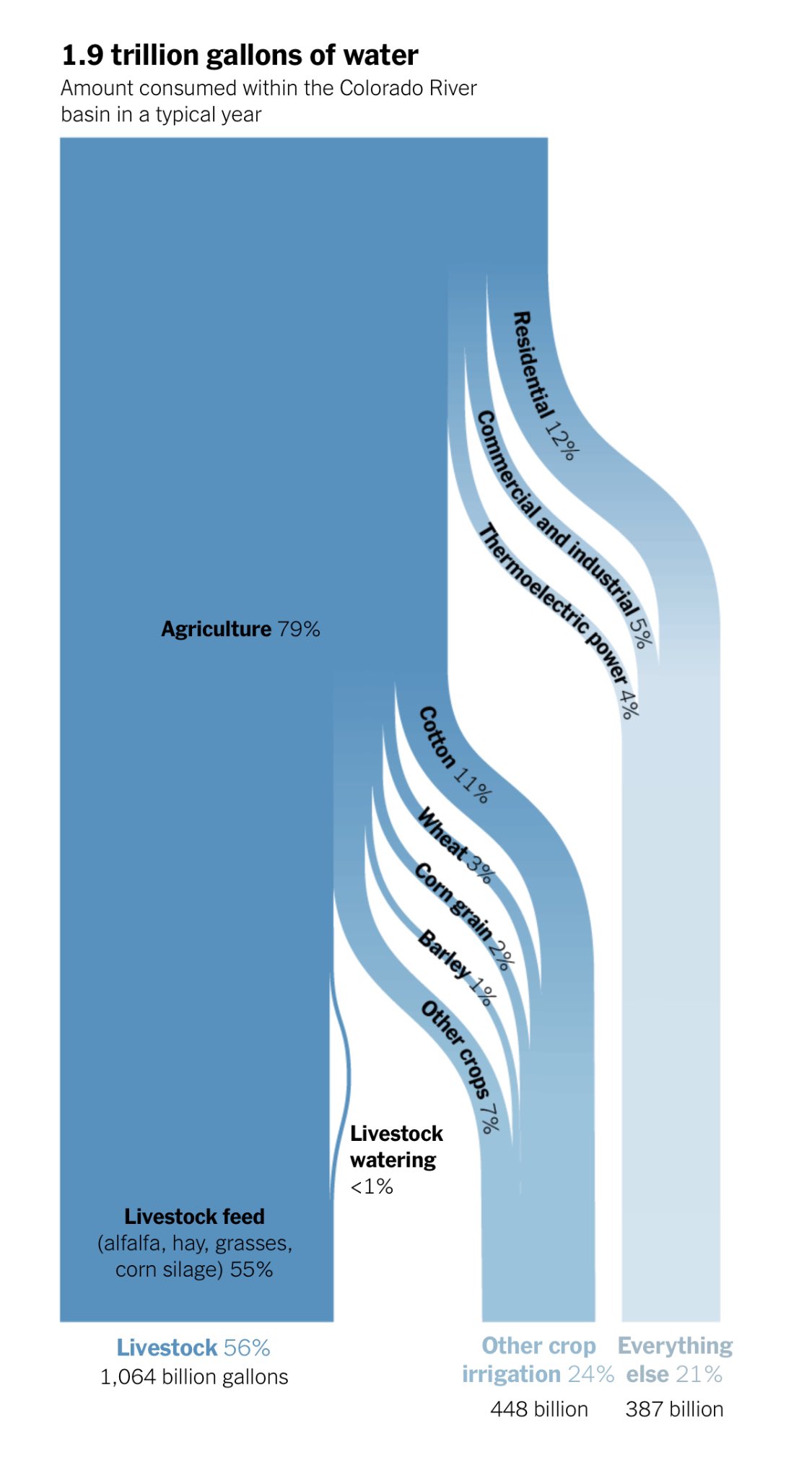The New York Times actually has a decent story.
Here's the biggies on what the Lower Basin states of the Colorado River Compact — California, Arizona and Nevada — have agreed to, and the four Upper Basin states of New Mexico, Colorado, Utah and Wyoming have tentatively signed off on.
First, this is a three-year deal. It merely postpones a long-term rewrite of the Compact by three years. Neoliberal John Fleck is probably doing huzzahs and hosannas somewhere. Don't follow his hype.
Second, the 3 million acre-feet of cuts? That's total over the three years. It's not bad, but, it's the minimum that needs to be done permanently in the Lower Basin. See Science Magazine from last year for what really needs to be done at a "minimum." But, they're not going to make a permanent deal until they get at least a bit of Upper Basin help.
More here on how this deal essentially is a boondoggle. With the "bribery" angle in place (for 3 years, $1.2 billion of Inflationmonger Joe's Inflation Reduction Act), alfalfa farmers will dig in their heels in four years. And, it ignores dams in the pipeline on the river's Upper Basin.
Third, it doesn't really address the elephant in the room. Aridzona can bitch about Saudi people buying up land there and irrigating alfalfa for Arabian horses — or Chinese beef. But, that doesn't excuse Aridzonans, or Californians on the west side of the river, from doing it themselves.
Fourth? While NOAA notes El Niño effects can be relatively weak in summer, that expected El Niño is already projected to be parking a dry high over the Southwest this summer. Hope you enjoy all the snowmelt because it's possible there won't be much of a monsoon season this year.
Fifth? Follow the money. Federal "bribery" achieved what Basin states couldn't last year.
Fifth, part 2? BuRec's threat to void current appropriation percentages in the lower Basin? Surprised California apparently thought that was real, given BuRec's fake banhammer last summer.
Sixth? Per that fake banhammer link, the odds of California preserving the Salton Sea just dropped further.
Robert Glennon has more details, noting that the feds are paying for 2.3 MAF of the 3MAF of cuts. He says more needs to be done, but given how hard it was to put together the original Compact, says that it should be within its framework and not starting anew. That said? The original deal expires in just 3 years, or, at the same time these temporary additional cuts go away. And, whatever the Supreme Court rules on Arizona v Navajo Nation, Indian water rights will loom much larger in 2026 than before. And, speaking of Thompson, he also weighs in; per him, it's most likely that the federal bribery is to take enough of that water-guzzling alfalfa out of circulation for three years by a short-term, specific, version of something like the Conservation Easement Program. So, not only is this short-term, it's short-term in a way that will backfire in three years. In addition, what if any of those people paid not to grow are the Arabs in Aridzona?
That said, that problem is not just on the Colorado. Look at what New Mexico does on southern New Mexico stretches of the Pecos and Rio Grande. Irrigation-driven dairy farming is wrecking Western water.
That's not to excuse irrigation-driven beef ranching, or the nostalgia of the likes of Jonathan Thompson. Nor is it to ignore ongoing PR by the National Cattleman's Beef Association pretending that sustainable beef is OK in our climate change world. (I ran into a guy on Medium making that claim, and now I wonder if he was a paid psyops.)
Finally, all of this ignores American Indian water rights issues, namely Navajo water rights claims on which the Supreme Court could rule later this month, per above comment. And, it's just possible that, even if the feds, behind Arizona, win, the victory would be Pyrrhic. See here.
Update to the last point? This HCN/Pro Publica piece about Aridzona screwing over Indians in general on water rights begins by noting just how this water could be used, but can't currently be used. A new hospital on the Big Rez stands unused because it doesn't have a guaranteed adequate water supply.

No comments:
Post a Comment
Your comments are appreciated, as is at least a modicum of politeness.
Comments are moderated, so yours may not appear immediately.
Due to various forms of spamming, comments with professional websites, not your personal website or blog, may be rejected.